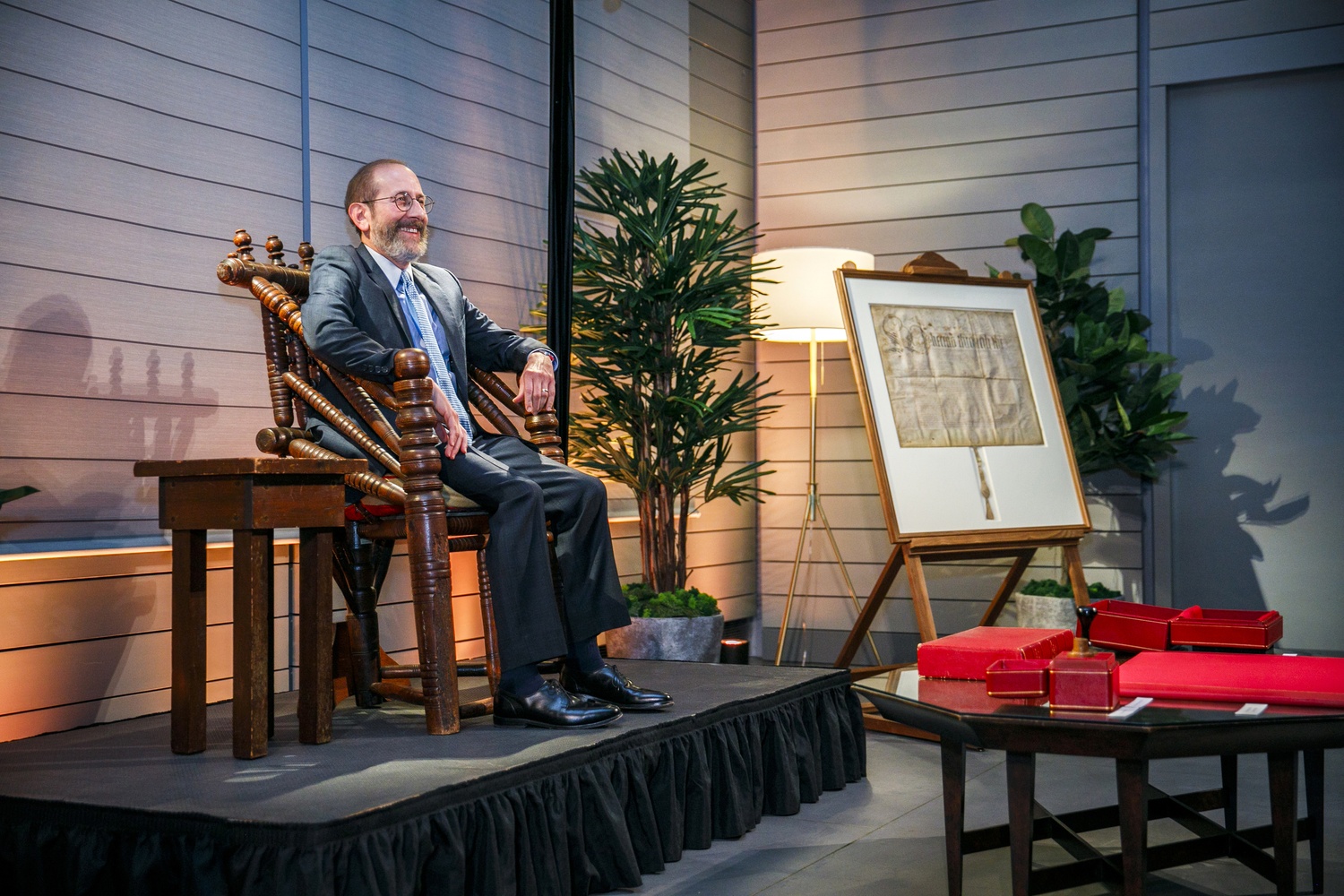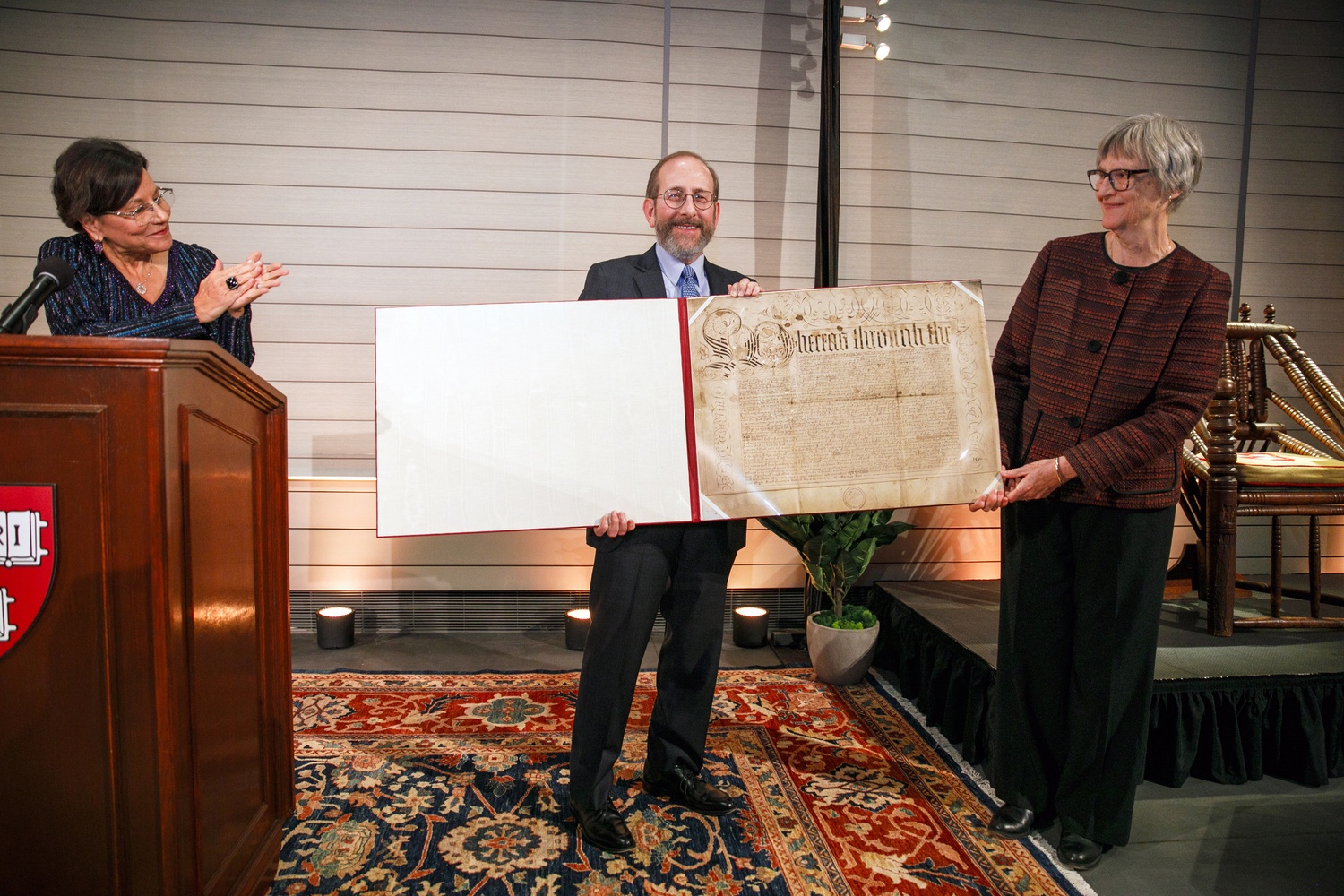
News
News Flash: Memory Shop and Anime Zakka to Open in Harvard Square

News
Harvard Researchers Develop AI-Driven Framework To Study Social Interactions, A Step Forward for Autism Research

News
Harvard Innovation Labs Announces 25 President’s Innovation Challenge Finalists

News
Graduate Student Council To Vote on Meeting Attendance Policy

News
Pop Hits and Politics: At Yardfest, Students Dance to Bedingfield and a Student Band Condemns Trump
Alan Garber ’76 Installed as Harvard’s 31st President in Private Ceremony
In his inaugural address, Garber cautioned fellow Harvard leaders against risk aversion
Alan M. Garber ’76 was inaugurated as the 31st president of Harvard University in a secret ceremony Saturday evening, four months after he was officially appointed to the role for a three-year term.
The private gathering, which was held in the Harvard Art Museums’ Menschel Hall, marked the third time Garber has been anointed president of Harvard, following his interim appointment in January and his permanent confirmation to the role in August.
Garber touted Harvard’s contributions to society during a speech at the installment ceremony, calling the University’s long history and reputation a “priceless gift.” However, he also pledged to continue to carry out ambitious reforms.
“Awareness of how damaging the loss of that reputation could be is among the reasons why we often proceed with caution, when we proceed at all,” Garber said. “Yet we forfeit opportunities when we feel as though the University cannot make a move without considering every possible ramification, without fully understanding every possible consequence.”
“In a world that confronts us with challenges and opportunities more frequently than ever before, we will need to move forward with greater alacrity — and to correct course more quickly — than has been our custom,” he added.
Despite the striking contrast between Garber’s intimate celebration in the basement of the Harvard Art Museums and the pageantry of the University’s typical presidential inaugurations in Harvard Yard, the event still featured many time-honored traditions.
Garber sat in the notoriously uncomfortable Holyoke Chair, which has served as the official chair of the Harvard president since the 18th century. He was also presented with the two seals of Harvard, the University’s two silver keys, and the Harvard Charter of 1650.
The last time Harvard chose to privately inaugurate a president was 1971, when former University President Derek C. Bok was installed before 110 people in the Faculty Room of University Hall. Bok’s subdued inauguration was held shortly after Nathan M. Pusey, Class of 1928, abruptly stepped down from the presidency after his botched handling of anti-Vietnam War protests on Harvard’s campus.
Garber’s installment ceremony was a similarly bittersweet affair for the University, occurring just less than a year after former Harvard President Claudine Gay resigned amid plagiarism allegations and accusations that she failed to adequately combat campus antisemitism.
Though The Crimson previously reported that Garber would not be honored with a typical presidential inauguration and that the University may opt for a more intimate celebration, Harvard spokesperson Jonathan L. Swain declined to comment on why the event was held in secret.
The event, which was closed to press, featured Garber’s four most recent predecessors as president, Harvard Corporation Senior Fellow Penny S. Pritzker ’81, and former Senior Fellow William F. Lee ’72. Garber’s family, the deans of Harvard’s schools, and other members of the University’s governing boards were also in attendance for the inauguration.
Former Harvard President Drew Gilpin Faust, who recruited Garber back to Harvard as provost in 2011, described him as “intellectual and a practitioner, a thinker and a doer.”
“At a time when trust in institutions generally, and in higher education in particular, has eroded so markedly, Alan radiates trustworthiness,” Faust said.
Pritzker and Lee also both delivered speeches during the ceremony, but a Harvard spokesperson declined to provide a copy of their complete remarks.
Former Harvard President Lawrence H. Summers presented two Harvard seals, while Gay handed Garber the oldest volume of college records from 1639. Bacow presented two silver keys to unlock the doors to Knowledge and Truth. Faust presented the Harvard Charter of 1650, granted by the Great and General Court of Massachusetts, which established the Harvard Corporation as the University’s highest governing body.
Just 14 months earlier, Pritzker had ceremonially presented Gay with the 1650 Charter as “one final symbol of authority.”
Garber devoted a significant portion of his remarks to the recent accomplishments of Harvard faculty members and their “contributions to humanity” — a now-familiar refrain from University leaders who have sought to highlight Harvard’s benefits to society amid skepticism from President-elect Donald Trump and his incoming administration.
Garber compared the experience of presiding over Harvard’s Commencement ceremony from his seat in the Holyoke Chair — which has been prone to tipping over — to the intense media attention that Harvard frequently faces.
“At my favorite event of the year, after having been part of Harvard for nearly three-quarters of my life, I found myself worried about falling flat on my face,” Garber said. “I tried not to move a muscle.”
“Prominence and visibility — and the close scrutiny they invite — can be paralyzing for individuals and for institutions alike,” he added.
However, Garber noted that Harvard and its leaders must not let the media spotlight prevent them from doing what is right for the University.
“An excessive aversion to risk is a risk in and of itself,” he said. “We must keep in mind, always, that the mistakes we have made — individually and collectively — may have been plentiful, but we have our long history to celebrate because they have not been fatal.”
“Our history demands that we plan boldly for a very long future,” Garber added. “We need to think not only in years and decades, but also in centuries.”
—Staff writer Emma H. Haidar can be reached at emma.haidar@thecrimson.com. Follow her on X @HaidarEmma.
—Staff writer Cam E. Kettles can be reached at cam.kettles@thecrimson.com. Follow her on X @cam_kettles.
Want to keep up with breaking news? Subscribe to our email newsletter.
Related Articles
From Our Advertisers

Over 300+ courses at prestigious colleges and universities in the US and UK are at your disposal.

Where you should have gotten your protein since 1998.

Serve as a proctor for Harvard Summer School (HSS) students, either in the Secondary School Program (SSP), General Program (GP), or Pre-College Program.

With an increasingly competitive Law School admissions process, it's important to understand what makes an applicant stand out.

Welcome to your one-stop gifting destination for men and women—it's like your neighborhood holiday shop, but way cooler.

HUSL seeks to create and empower a community of students who are seeking pathways into the Sports Business Industry.


